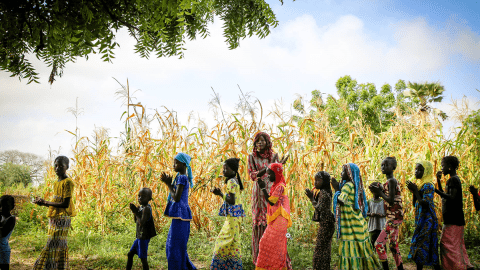
Child Protection and Participation
What we want to do:
We want all children to know they are loved by God and their neighbors and to be cared for, protected and participating in the decisions that affect them and their lives. We are working towards this by:
- Ensuring families and communities understand children’s rights
- Helping families understand the importance of birth registration
- Making sure children live in safe families and communities with adequate places to play and develop
- Making sure children are respected and allowed to participate in decisions that affect them
- Ensuring children enjoy a positive relationship with their peers, family members and communities
- Helping children to grow in their discovery of God’s love in an environment that gives them this freedom
What is the problem?
Harmful cultural and religious beliefs coupled with socioeconomic barriers put children in Senegal in danger. Polygamy and child marriages are common. Culturally, parents are often emotionally distant from their children and, as a result, are not active participants in their education. Additionally, the lack of law enforcement, the long distances that need to be traveled to report abuse and the inadequate funding of the child protection sector mean that many times justice is not achieved. All of this coupled with the fact many families still prefer to have their children born at home and have to travel long distances for them to be registered means that a lot of children never are.
How is World Vision addressing the issues?
We are bringing parents, community members and religious leaders together to learn about the issues facing children in their communities and equipping them to take steps to address these issues. And, to improve family relationships, we are providing parents and faith leaders with a right understanding of the role of families and of discipline, one that does not involve physical aggression.
Is what World Vision doing working?
Yes! As part of the programming strategies and specific interventions at individual, family, community and government levels concerning child protection, World Vision supported the establishment of 330 Local Child Protection Committees in 2019. This brought to 610 the number of committees to effectively incorporate and address child protection issues in community programs, as well as other interventions for vulnerable children.
In parallel with solidifying local child protection procedures, World Vision also focused on strengthening the ability of children to protect themselves by launching 182 kids’ clubs, where 16,947 children and young people including 8,550 girls and 8,394 boys are empowered to become agents of social change. This contributes greatly to their own development, their own well-being, and that of the community. Indeed, implementing initiatives to support kids’ clubs and other social facilities for children creates the very settings where they can deepen their expertise in detecting the early signs of abuse towards children, as well as increasing their knowledge of measures to guard against the risks of sexual abuse and exploitation in general.
Participation activities are focused on developing children’s life skills and strengthening their abilities to protect themselves but also to be able to express themselves on issues relating to child protection, and to better understand notions of abuse and violence. Above all comes the ability to self-protect and reduce the risk of falling prey to exploitation. Through these activities children and young people also get the chance to address difficult personal and family issues in a safe environment, and to make choices in their everyday lives that help them achieve their current and future goals.
Awareness-raising sessions are organized to enable communities to discuss topics as wide-ranging as child sexual abuse and its signs, parental neglect, child labor, self-protection strategies for children, the reflexes and strategies to rehearse for situations of violence and sexual abuse, and thus discover common concerns and perspectives on the problem of child protection.
The monitoring system has logged 44 child protection emergencies, triggering informed and strategic interventions in terms of care for victims and their psychosocial rehabilitation. Such violations often go poorly recognized and unreported, which poses an obstacle to the respect of children’s human rights.
*Numbers from 2019